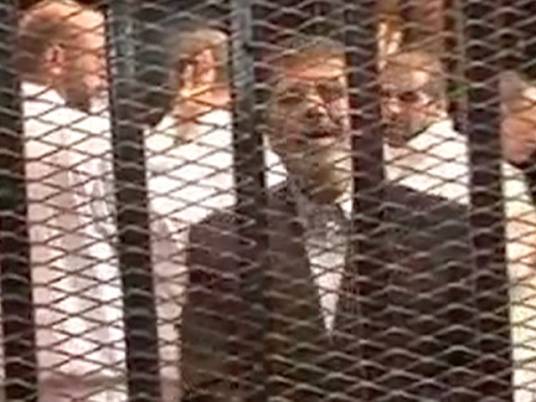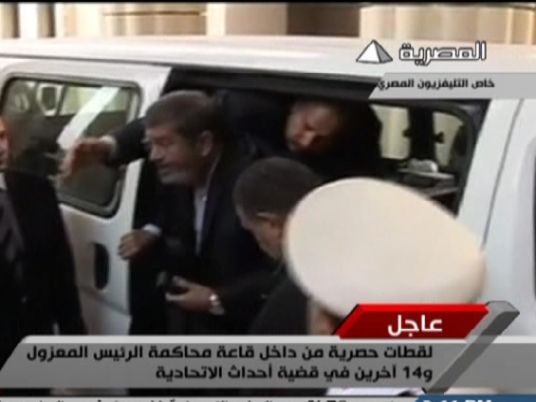
As laser beams cut through the night sky above giant screens, Mohamed Selim al-Awa, a small, neatly dressed man in glasses, launched his presidential bid against a stunning backdrop of the Cairo Citadel.
A punctilious man, Awa spent the first five minutes of his speech on Tuesday carefully explaining the Citadel’s symbolic significance, in case it had been lost on his supporters.
The Citadel, Awa said, is Salah Eddin’s bastion of safety. It represents Egypt’s eternality and steadfastness in the face of change and uncertainty. It is where the good and the noble were punished and even tortured for their integrity. It represents the values of his campaign.
There is a less charitable interpretation to the choice of venue, however: that Awa is a man who has been under attack more or less constantly since the public noticed him.
Perhaps, then, the choice of a fortress from which to launch his presidential ship is chest-thumping at his critics or, subliminally, some sort of giant concrete safety blanket. Even the campaign symbol that Awa has ended up with (candidates choose a symbol from a limited selection and Awa was lumbered with an umbrella) suggests a man waiting for a deluge, who knows that when it rains, it pours.
Not that it has rained much recently on Awa who — has not said controversial statement in awhile — seems to have been forgotten about. Despite the fact that, like all the other presidential candidates, he has been busy crisscrossing the country illegally campaigning (the law says that campaigns were meant to start on 1 May) in past months and has made regular television appearances, he is trailing in opinion polls.
His campaign, which began with verve, has lost steam, and one wonders whether the “human being” referred to in one of his slogans — “rediscovery of the Egyptian human being” — is actually Awa himself.
The campaign launch event was all about telling us who Awa is, and isn’t.
He enlisted old friends from the Arabic Language Institute to eulogize him in perfect modern standard Arabic. One of them, Sultan Abu Ali, described how Awa had been “shocked” when a television presenter asked the presidential nominee about his wife during an interview.
Awa’s wife is an “honorable lady” Abu Ali declared, unlike the wives of some other presidential candidates who, he said somewhat obliquely, if they find themselves a First Lady, “will behave like Mary Antoinette.”
Ex-Muslim Brotherhood leader Kamal al-Helbawy told an ecstatic crowd that Awa “could lead the Islamic omma [nation], not just head Egypt,” while Zakaria Mahmoud, a member of the hardline Islamic Jama’a al-Islamiya group in Monufiya praised Awa as “champion of the moderate Islam project”.
The presence of these two figures is significant. Awa set out his moderate Islam stall long before he declared his intention to run for president, but has been eclipsed by former Muslim Brotherhood member and presidential candidate Abdel Moneim Abouel Fotouh, whose liberal Islam formula — delivered through slick video packages and rock concert type campaign events — has won the support of both liberals and Islamist groups.
In fact, Awa has fallen through the Islamic cracks now that groups such as the Salafi Dawah, left without a candidate after the exclusion of Hazem Salah Abu Ismail, have announced their support for Abouel Fotouh and the Muslim Brotherhood have put forward their own candidate, Mohamed Morsy.
That leaves his revolutionary credentials as a selling point, and during Tuesday’s event, supporters were repeatedly force-fed a video montage of Awa in Tahrir during the 18 days set against the plaintive tones of Aida al-Ayouby’s ode to Tahrir Square with Cairokee, “Ya el Medan.”
Awa’s street cred with revolutionaries and liberals, however, is undermined by 2010 comments he made about Christians storing weapons in their churches, comments Awa insists were taken out of context but follow him around wherever he goes. He has also come under attack for a perceived failure to criticize the ruling Supreme Council of the Armed Forces for their actions.
At the other end of the spectrum, Awa’s long association with Iran and academic interest in Shia Islam at a time of tension in Egypt-Iranian diplomatic relations has lost him support in majority Sunni Egypt and even led to allegations that Awa is secretly Shia.
Awa was asked about his “position on Shias and Copts” at the end of the event on Tuesday and, somewhat bad-temperedly, responded that he has “answered these questions 100 times.”
“Whoever started the Shia rumor will be dealt with by God,” Awa said, adding that, “Copts are protected in Egypt because they are Egyptian citizens.” He then quoted a Quranic verse enjoining Muslims to treat Christians well.
His campaign platform is the usual vague hodgepodge of education, employment and law and order beloved by presidential candidates everywhere.
He is an accomplished public speaker, however, and described the current ills afflicting Egypt (without putting forward solid solutions) in impeccable formal Arabic to the obvious delight and enthusiasm of his supporters, who interrupted him repeatedly in order to chant their support.
After a free buffet, Awa supporters piled onto shuttle buses to take them down the steep winding road to the Citadel exit with their complimentary Awa folders containing a leaflet, notepad, pen and CD.
Supporters Egypt Independent spoke to were drawn to Awa because of his independence, moral integrity and outspoken criticism of the former regime.
20-year-old Mohame Waguih from Damietta described Awa as “the only skilled candidate” who has been hampered by his inability to describe his political platform properly because of the “accusations constantly thrown at him.”
Yaseen Abdel Salam from Fayoum, when asked whether he thinks that Awa has popular support, said he is “optimistic,” even though, he said, Fayoum is “wall to wall Muslim Brotherhood.”
“Awa is an Islamic thinker, a man of principle who speaks honestly, but this hasn’t worked to his advantage because in politics, honesty doesn’t always pay off,” Abdel Salam said.



